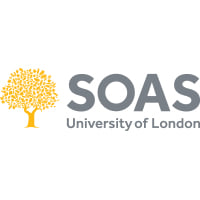South East Asian Studies
Position Details (PhD Program)
The South East Asian Studies programme from SOAS University of Londonoffers the widest coverage in Europe of research and teaching related to the languages and cultures of the principal countries of South East Asia.
Its primary commitment is to the four languages Burmese, Indonesian/Malay, Thai and Vietnamese, and their literatures, cinemas and associated cultures. REF 2014 submissions by members of the Department included significant and paradigm-shifting monographs, edited collections, journal articles and book chapters in cinema and gender, literary criticism, cultural history and postcolonial studies. It is a flourishing and friendly Department with close links to recent alumni.
The research interests of the Department’s members include: classical Malay literature; modern literature in Malay, Indonesian, Thai, and Vietnamese; Islam in South East Asia; language pedagogy; phonetics; gender studies; oral literature and folklore; cinema in South East Asia; and translation. These interests are increasingly reflected in the kind of work that is undertaken by the Department’s current doctoral researchers.
Employment
Graduates of the South East Asian Studies programme from SOAS University of London leave SOAS not only with linguistic and cultural expertise, but also with skills in written and oral communication, analysis and problem solving.
Recent graduates have been hired by:
- Africa Matters
- Amnesty International
- Arab British Chamber of Commerce
- BBC World Service
- British High Commission
Courses include:
- Year 1
Year 1 full-time students (year 2 for part-time students) are required to submit a core chapter and research proposal (of about 10,000 words)
- Year 2
The second year (or Part Timeequivalent) is normally spent engaged in research. This may be by any combination of fieldwork and research in libraries and material collection as agreed between the student and the supervisor(s).
- Year 3
The third year (or part-time equivalent) is devoted to writing up research for the PhD thesis. During this time, students will normally give a presentation in a research seminar organised by the Departmental Research Tutor, comprising a select number of staff members with special expertise in the topic and other research students. During the third year (or Part Timeequivalent) students will present draft chapters to their main supervisor for comment, before completing a final draft of the thesis.



 SOAS University of London
SOAS University of London